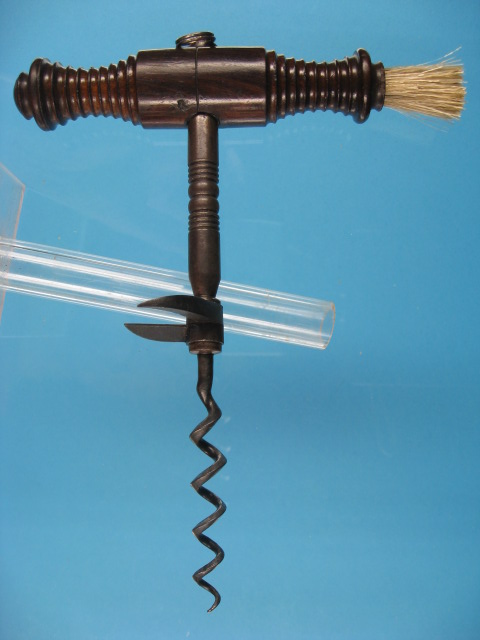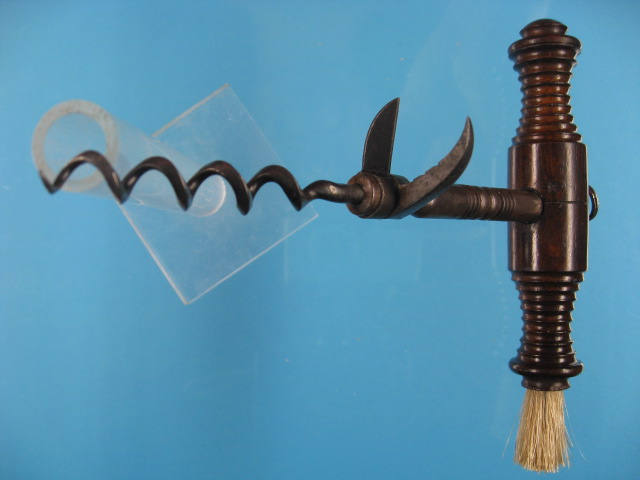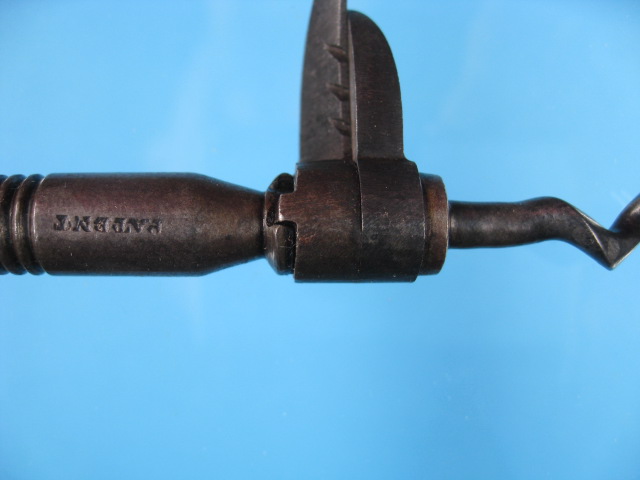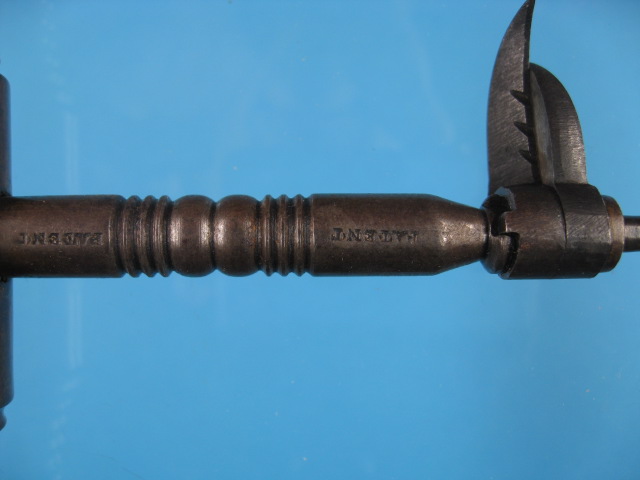Patent, Patent, Corkscrew.
Posted: 06/21/2012It suprises me how many different variations of corkscrew have over time been manufactured. Regularly corkscrews come to light that I have never seen before, below is an example that falls into this catagory.
This English Straight Pull corkscrew is of a very high quality, the rosewood handle is finely turned and shaped, the shaft has interesting turnings. It was most likely manufactured in the 19th century. Having only seen this one example, I would catagorise it as very rare.
At the bottom of the shaft above the worm there are two toughened cutting blades. These blades are very sharp and swivel on the shaft, they are finger operated. Using finger pressure the two blades are pushed together cutting through string or wire that may secure a cork into the top of a bottle.
Operating the cutting blades is awkward and the cutting device is not very effective.
A corkscrew of this design would have been expensive to make. Each of the blades would have been heat treated, toughened, to give them a durable cutting edge. Additionally the blades have been ground into shape, this can be seen on close examination of the surfaces.
Below is an image showing a close up of the blades,
Why is this corkscrew design rare?
Personally I think the answer is two fold. First of all, it is very likely this corkscrew was expensive to buy due to its complicated design and expensive manufacturing costs. Secondly, this design does not work effectively, due to the awkwardness of operating the cutting blades. A large amount of force would have been needed to cut through the wire using only finger pressure, especially when the cutting edge on the blades had over time become dull.
The cutting blades were intended to be operated by finger pressure, if not, there would only need to be one blade present and that blade could be fixed ridgedly, a much cheaper manufacturing process.
The image above shows a close up view of the shaft with its markings. We can see the word "PATENT" clearly stamped on the shaft twice. What is the relevance of this marking? There is no known patent protection granted for a corkscrew of this type.
Many corkscrew makers are known to have stamped there inventions "PATENT" even though they never sought protection under the law. This gave unscrupulous makers an unfair ecomonic advantage over there competitors. Applying for patent protection for an invention was a very expensive process. Marking you invention "PATENT" gave the item more importance and enabled the retailer or manufacturer to achieve a higher price, as well as making the item easier to sell and seem more important.
Also Wally you looking forward to the Olympics next month? bet you can't wait! :0)
Well said Wally, well said!
Dear Ron I think thats enough discussion of semantics and spelling and obscure latin phrases. This is meant to be a forum for discussing corkscrew history. I think "Obstando Promoves" is more appropriate
Dear Peter, Arse longa vita brevis
dear Peter thanks for the kriticizum, I take your point. the fun with this site is wen you use the google translate. try your little crit in albanian or even arabic or enny ov the uther langwages, and "arsey" is the world's most untranslatable werd
Dear Ron, There is, indeed a word in the English dictionary that is very like 'ridgedly'. It is 'rigidly', a word that is phonetically almost identical,means exactly that which Steve intended to convey,(and I, for one, plainly understood), and differs only in that it is the correct spelling. If Steve is to be this generous with his time, and share with us some of his collection, let's try not to be arsey about spelling, eh?
It is possible that the patent referred to is for the cutting blades and not for a corkscrew, so I suggest you look in the cutlery patents to find a reference. The example in Christies was defective, the other piece was missing. The most likely reason this corkscrew is rare is that most of them got thrown away, I doubt if it was more expensive to produce than a Thomason of which there are at least 130,000 examples. There is no word in the English dictionary like ridgedly.
Hi Steve, great looking thing! I have a hazy memory of something similar, but with one blade, selling at Christie's many moons ago. I will try and find it.
What a brilliant corkscrew, Steven. Well done.
Write a comment
Your Name:Your Comment: Note: HTML is not translated!





